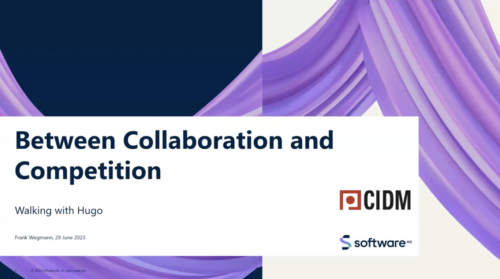Recorded on
June 21, 2023

Taxonomies and terminologies can be seen as different sides of the same coin. However, the focus is quite different. Taxonomies make linguistic data available for machines and humans to distill knowledge and often to manage chaos. Terminologies harmonize language, make sure everyone uses consistent and correct words, and try to avoid chaos from the outset. Organizations obviously require both, so it is only natural for Semantic Web Company and Kaleidoscope to integrate their two platforms and offer a combined taxonomy and terminology management solution.
This presentation and demo show you:
- how to connect your Pool Party taxonomy to the Kalcium terminology suite
- and add terminology benefits to your existing data:
- human-grade, rich metadata, organizational decision workflows, and automatic guidance in word choice for authors and translators alike
Presented by Klaus Fleischmann and Sebastian Gabler

Klaus Fleischmann studied translation and IT in Vienna, and holds an MA in Conference Interpreting from Monterey, California, and a MAS in Technical Communication from Krems, Austria. In 1996, he founded Austria-based Kaleidoscope, a company implementing content, translation, and terminology management processes for internationally active companies. Kaleidoscope develops online collaboration software for enterprise-level terminology workflow, translator query management, in-country review, etc., making the translation quality process comprehensible and strategically manageable. In 2007, he became CEO of Austria´s leading LSP, Eurocom Translation Services. Always active in the industry, Klaus got voted into the Gala Board of Directors in 2015 and 2017.
 Sebastian Gabler originally trained as a Recording Producer with a diploma from the Berlin University of the Arts (UdK) and 5 years of music production for radio, TV, and the recording industry; he has been pursuing a career in archive and information management for over 15 years
Sebastian Gabler originally trained as a Recording Producer with a diploma from the Berlin University of the Arts (UdK) and 5 years of music production for radio, TV, and the recording industry; he has been pursuing a career in archive and information management for over 15 years
In 2017, he joined Semantic Web Company in Vienna and was appointed Chief Customer Officer in 2020. In this position, he supports customers from all industries in developing intelligent applications with semantic AI. Sebastian has worked in various companies in the areas of technology, sales, and project management, including 11 years in the field of audiovisual archiving, and has recently completed his Master of Sciences in Library and Information Science.


 Doug Brook is the Director of Technical Documentation and Localization for adaptive computing at Advanced Micro Devices, Inc. (AMD). Throughout 20+ years in senior management of technical content organizations, he has led evolutions of information resources to improve user experience for numerous high-tech companies, large and small. A past Society for Technical Communication (STC) panelist, he holds undergraduate and graduate degrees from Carnegie Mellon University. He has successfully navigated technical documentation teams through several corporate acquisitions and has introduced new authoring systems and content delivery platforms multiple times. As an experienced technical writer, educator, and theatre artist, he leverages a broad perspective of how to effectively serve diverse audience types and how to optimize processes for people to more effectively serve them.
Doug Brook is the Director of Technical Documentation and Localization for adaptive computing at Advanced Micro Devices, Inc. (AMD). Throughout 20+ years in senior management of technical content organizations, he has led evolutions of information resources to improve user experience for numerous high-tech companies, large and small. A past Society for Technical Communication (STC) panelist, he holds undergraduate and graduate degrees from Carnegie Mellon University. He has successfully navigated technical documentation teams through several corporate acquisitions and has introduced new authoring systems and content delivery platforms multiple times. As an experienced technical writer, educator, and theatre artist, he leverages a broad perspective of how to effectively serve diverse audience types and how to optimize processes for people to more effectively serve them.




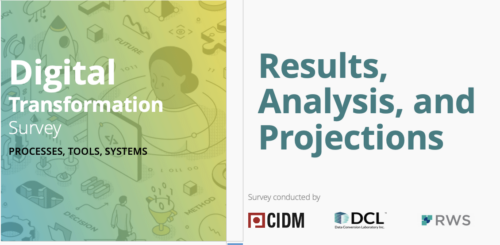


 Dawn Stevens, President, Comtech Services and Director of CIDM has 28 years of practical experience in virtually every role within a documentation and training department, including project management, instructional design, writing, editing, and multimedia programming. Dawn is the perfect advisor to identify and remove the challenges you face in producing usable, technical information and training content. With both engineering and technical communication degrees, Dawn combines her solid technical foundation with strong writing and design skills to lead our team of consultants and specialists in providing the expertise you need.
Dawn Stevens, President, Comtech Services and Director of CIDM has 28 years of practical experience in virtually every role within a documentation and training department, including project management, instructional design, writing, editing, and multimedia programming. Dawn is the perfect advisor to identify and remove the challenges you face in producing usable, technical information and training content. With both engineering and technical communication degrees, Dawn combines her solid technical foundation with strong writing and design skills to lead our team of consultants and specialists in providing the expertise you need.
 Mark Gross, President, Data Conversion Laboratory, is a recognized authority on XML implementation and document conversion. Mark also serves as Project Executive, with overall responsibility for resource management and planning. Prior to joining DCL in 1981, Mark was with the consulting practice of Arthur Young & Co. Mark has a BS in Engineering from Columbia University and an MBA from New York University. He has also taught at the New York University Graduate School of Business, the New School, and Pace University. He is a frequent speaker on the topic of automated conversions to XML and SGML.
Mark Gross, President, Data Conversion Laboratory, is a recognized authority on XML implementation and document conversion. Mark also serves as Project Executive, with overall responsibility for resource management and planning. Prior to joining DCL in 1981, Mark was with the consulting practice of Arthur Young & Co. Mark has a BS in Engineering from Columbia University and an MBA from New York University. He has also taught at the New York University Graduate School of Business, the New School, and Pace University. He is a frequent speaker on the topic of automated conversions to XML and SGML.
 Chip Gettinger is the VP of Global Solutions Consulting at RWS, he manages a team that works with customers in maximizing global content with RWS. He has experience working with customers to develop global content strategies, business ROI adoption drivers, change management, and technology adoption for component content management systems. He speaks and blogs about customer successes working closely with industry standards, partners, and customers in technology solutions and deployments.
Chip Gettinger is the VP of Global Solutions Consulting at RWS, he manages a team that works with customers in maximizing global content with RWS. He has experience working with customers to develop global content strategies, business ROI adoption drivers, change management, and technology adoption for component content management systems. He speaks and blogs about customer successes working closely with industry standards, partners, and customers in technology solutions and deployments. 


 Hareesh Kanakaswamy is the Portfolio Manager of Digital Services Solutions at Sandvik Mining and Construction G.m.b.H. With 14+ years of experience in product development and aftermarket operations, he specializes in constructing end-to-end digital ecosystems for servitization strategies. Hareesh is a firm believer in innovation as the key to sustainable progress for humanity.
Hareesh Kanakaswamy is the Portfolio Manager of Digital Services Solutions at Sandvik Mining and Construction G.m.b.H. With 14+ years of experience in product development and aftermarket operations, he specializes in constructing end-to-end digital ecosystems for servitization strategies. Hareesh is a firm believer in innovation as the key to sustainable progress for humanity.
 Harald Stadlbauer, MD is General Manager of the NINEFEB Group of companies, dedicated to the advancement of Technical Communication, like Technical Documentation as well as eLearning to the intelligent delivery of it. He is actively engaged in developing iiRDS further as well as contributing to the AAS (Asset Administration Shell) sub-models of the IDTA (Industrial Digital Twin Association)
Harald Stadlbauer, MD is General Manager of the NINEFEB Group of companies, dedicated to the advancement of Technical Communication, like Technical Documentation as well as eLearning to the intelligent delivery of it. He is actively engaged in developing iiRDS further as well as contributing to the AAS (Asset Administration Shell) sub-models of the IDTA (Industrial Digital Twin Association)
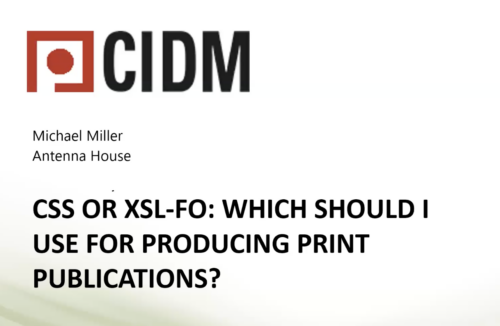


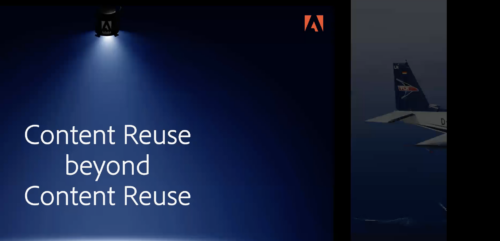

 Stefan Gentz is the Senior Worldwide Evangelist for Technical Communication at Adobe, headquartered in San Jose, California, USA. Stefan’s mission is to inspire enterprises and technical writers around the world and show how to create compelling technical communication content with the Adobe Technical Communication tools. He is also a certified Quality Management Professional (TÜV), ISO 9001 / EN 15038 auditor, ISO 31000 Risk Management expert, and Six Sigma Champion.
As a sought-after keynote speaker and moderator at conferences around the world, he travels around the globe half of the year. Besides that, he has been the European Ambassador for the Globalization and Localization Association (GALA) for many years, a member of the tekom Conference Advisory Board for several years, and a founding member of the tekom
Stefan Gentz is the Senior Worldwide Evangelist for Technical Communication at Adobe, headquartered in San Jose, California, USA. Stefan’s mission is to inspire enterprises and technical writers around the world and show how to create compelling technical communication content with the Adobe Technical Communication tools. He is also a certified Quality Management Professional (TÜV), ISO 9001 / EN 15038 auditor, ISO 31000 Risk Management expert, and Six Sigma Champion.
As a sought-after keynote speaker and moderator at conferences around the world, he travels around the globe half of the year. Besides that, he has been the European Ambassador for the Globalization and Localization Association (GALA) for many years, a member of the tekom Conference Advisory Board for several years, and a founding member of the tekom 
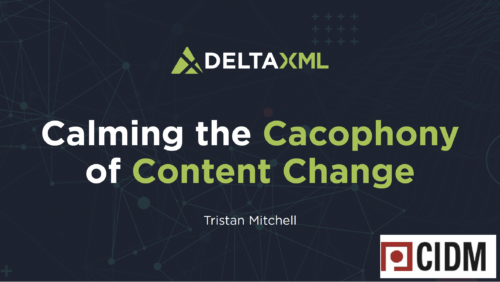

 Tristan is Product Director at DeltaXML, a technology company with world-leading software products for the management of change in structured content. He has a deep understanding of DeltaXML’s product suite and loves to help customers create extra value in their content using change management. Tristan is a father to three daughters, a movie lover, and a keen runner.
Tristan is Product Director at DeltaXML, a technology company with world-leading software products for the management of change in structured content. He has a deep understanding of DeltaXML’s product suite and loves to help customers create extra value in their content using change management. Tristan is a father to three daughters, a movie lover, and a keen runner.
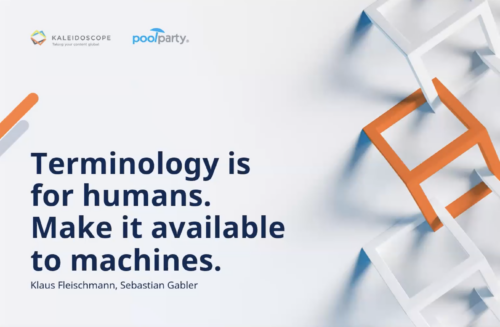


 Sebastian Gabler originally trained as a Recording Producer with a diploma from the Berlin University of the Arts (UdK) and 5 years of music production for radio, TV, and the recording industry; he has been pursuing a career in archive and information management for over 15 years
Sebastian Gabler originally trained as a Recording Producer with a diploma from the Berlin University of the Arts (UdK) and 5 years of music production for radio, TV, and the recording industry; he has been pursuing a career in archive and information management for over 15 years

 Daniel Nutburn is an accomplished executive and the Vice President of Global Partners and Alliances at Acrolinx. Daniel's got a wealth of experience in channel development, alliance management, and software solution selling. He's built an international partner network and has a solid track record of success with blue-chip and high-growth software companies.
Beyond his professional achievements, Dan is most proud of his ability to embarrass his daughters with his Karaoke singing and Cacti collection. LinkedIn:
Daniel Nutburn is an accomplished executive and the Vice President of Global Partners and Alliances at Acrolinx. Daniel's got a wealth of experience in channel development, alliance management, and software solution selling. He's built an international partner network and has a solid track record of success with blue-chip and high-growth software companies.
Beyond his professional achievements, Dan is most proud of his ability to embarrass his daughters with his Karaoke singing and Cacti collection. LinkedIn:  Jamila Elouazani is the Director of Partner Solutions, Global at Acrolinx, a leading content optimization technology for enterprise companies. With years of experience working in solution and product-focused environments, Jamila has honed her skills in providing technical support to businesses looking to close deals with Fortune 500 companies.
Jamila Elouazani is the Director of Partner Solutions, Global at Acrolinx, a leading content optimization technology for enterprise companies. With years of experience working in solution and product-focused environments, Jamila has honed her skills in providing technical support to businesses looking to close deals with Fortune 500 companies.



 Amber Swope is an internationally recognized Information Architect, DITA expert, and IA consultant. With over 20 years of information development experience and 15 years of DITA expertise, Amber specializes in helping organizations create opportunity through IA.
Amber Swope is an internationally recognized Information Architect, DITA expert, and IA consultant. With over 20 years of information development experience and 15 years of DITA expertise, Amber specializes in helping organizations create opportunity through IA. 